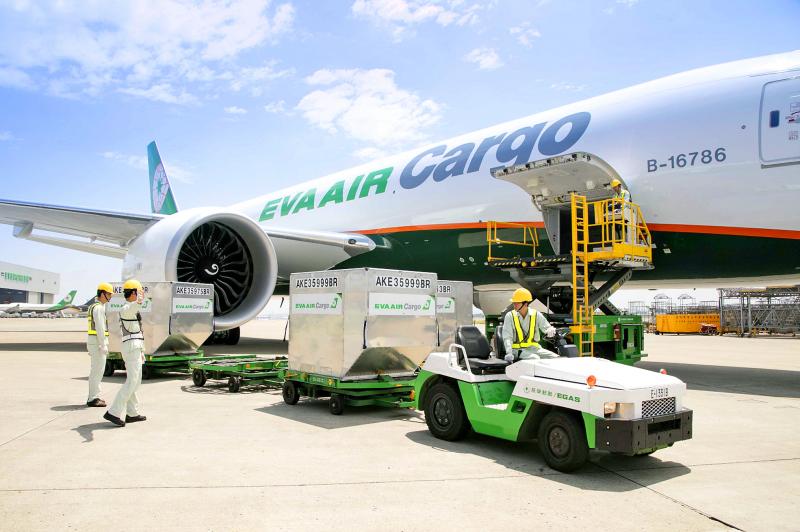EVA Airways Corp’s (長榮航空) board of directors on Friday approved the purchase of a new Boeing Co 777F freighter jet, the airline’s latest effort to boost its cargo capacity after acquired three 777Fs last year.
EVA, which has eight Boeing 777F aircraft, is scheduled to receive its newest addition by the end of next year, it said in a statement.
The plane is to cost about US$417 million, it said.

Photo courtesy of EVA Airways Corp
“The decision [for the purchase] was made because of growth in demand for air cargo, and thus we hope to raise our freight capacity to improve competitiveness and our ability to handle risk,” EVA president Clay Sun (孫嘉明) said.
Sun cited Boeing’s forecast that the compound annual growth rate in the air freight market over the next 20 years would be 4 to 4.6 percent, while the global cargo fleet in 2040 would be 70 percent greater than prior to the COVID-19 pandemic because of sustained demand tied to the expansion of e-commerce and air freight.
“We would also consider next-generation cargo planes for our long-term flight network plans. We hope to adjust our freight network and capacity more flexibly to meet market demand,” Sun said.
EVA has hired Israel Aerospace Industries Ltd to convert three Boeing 700-300ER passenger jets into cargo planes in 2025, bringing the airline’s cargo fleet to 12, Sun said.
EVA in 2020 canceled orders for seven Boeing 787-10 Dreamliner passenger jets, replacing them with orders for three 777F cargo aircraft and four smaller 787-9 passenger jets, it said, adding that it received the cargo planes last year.
EVA reported NT$30.09 billion (US$1.01 billion) in revenue in the first quarter of the year, up 52.9 percent from a year earlier on the back of robust cargo demand. On a quarterly basis, revenue declined 12 percent, company data showed.
The airline posted net profit of NT$3.35 billion in the first three months, compared with net losses of NT$2.2 billion in the same period last year, when passenger revenue plummeted due to pandemic-related border controls.
Earnings per share were NT$0.64 last quarter, compared with losses per share of NT$0.45 a year earlier, data showed.

Taiwan Semiconductor Manufacturing Co (TSMC, 台積電) founder Morris Chang (張忠謀) yesterday said that Intel Corp would find itself in the same predicament as it did four years ago if its board does not come up with a core business strategy. Chang made the remarks in response to reporters’ questions about the ailing US chipmaker, once an archrival of TSMC, during a news conference in Taipei for the launch of the second volume of his autobiography. Intel unexpectedly announced the immediate retirement of former chief executive officer Pat Gelsinger last week, ending his nearly four-year tenure and ending his attempts to revive the

WORLD DOMINATION: TSMC’s lead over second-placed Samsung has grown as the latter faces increased Chinese competition and the end of clients’ product life cycles Taiwan Semiconductor Manufacturing Co (TSMC, 台積電) retained the No. 1 title in the global pure-play wafer foundry business in the third quarter of this year, seeing its market share growing to 64.9 percent to leave South Korea’s Samsung Electronics Co, the No. 2 supplier, further behind, Taipei-based TrendForce Corp (集邦科技) said in a report. TSMC posted US$23.53 billion in sales in the July-September period, up 13.0 percent from a quarter earlier, which boosted its market share to 64.9 percent, up from 62.3 percent in the second quarter, the report issued on Monday last week showed. TSMC benefited from the debut of flagship

A former ASML Holding NV employee is facing a lawsuit in the Netherlands over suspected theft of trade secrets, Dutch public broadcaster NOS said, in the latest breach of the maker of advanced chip-manufacturing equipment. The 43-year-old Russian engineer, who is suspected of stealing documents such as microchip manuals from ASML, is expected to appear at a court in Rotterdam today, NOS reported on Friday. He is accused of multiple violations of the sanctions legislation and has been given a 20-year entry ban by the Dutch government, the report said. The Dutch company makes machines needed to produce high-end chips that power

Taiwan would remain in the same international network for carrying out cross-border payments and would not be marginalized on the world stage, despite jostling among international powers, central bank Governor Yang Chin-long (楊金龍) said yesterday. Yang made the remarks during a speech at an annual event organized by Financial Information Service Co (財金資訊), which oversees Taiwan’s banking, payment and settlement systems. “The US dollar will remain the world’s major cross-border payment tool, given its high liquidity, legality and safe-haven status,” Yang said. Russia is pushing for a new cross-border payment system and highlighted the issue during a BRICS summit in October. The existing system